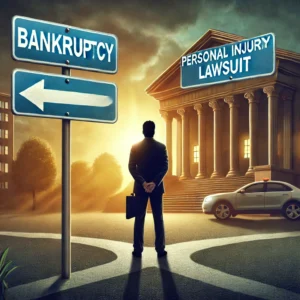How Bankruptcy Impacts Texans with Personal Injury Lawsuits Pending

Navigating the legal landscape can be challenging, especially when dealing with both bankruptcy and a pending personal injury claim in Texas. Understanding how these two legal processes intersect is crucial for protecting your rights and financial interests.
Understanding the Intersection of Bankruptcy and Personal Injury Claims in Texas
When facing overwhelming debt, filing for bankruptcy may seem like a viable solution. However, if you have a pending personal injury lawsuit, it’s essential to comprehend how bankruptcy could affect your potential settlement.
How Does Filing for Bankruptcy Affect My Personal Injury Claim?
Filing for bankruptcy initiates an automatic stay, which halts most legal proceedings against you. But what does this mean for your personal injury lawsuit?
-
Chapter 7 Bankruptcy: In a Chapter 7 filing, your assets—including potential personal injury settlements—become part of the bankruptcy estate. The appointed trustee may claim a portion of your settlement to pay creditors. However, Texas law provides certain exemptions that might protect your personal injury claim. Learn more about Chapter 7 Bankruptcy and Asset Protection.
-
Chapter 13 Bankruptcy: This type involves a repayment plan over three to five years. Your personal injury settlement could influence the repayment amount, but you might retain more control over the funds compared to Chapter 7.
Are Personal Injury Settlements Exempt in Texas Bankruptcy?
Texas offers specific exemptions to protect certain assets during bankruptcy. Regarding personal injury settlements:
-
Personal Bodily Injury Exemption: Texas law allows you to exempt compensation for personal bodily injuries up to a certain amount, excluding pain and suffering or pecuniary losses.
-
Wildcard Exemption: In some cases, a portion of your settlement may be protected under a wildcard exemption, which can be applied to any property.
It’s imperative to consult with a knowledgeable attorney to determine which exemptions apply to your situation.
What Happens If I Receive a Personal Injury Settlement After Filing for Bankruptcy?
The timing of your injury and subsequent settlement plays a significant role:
-
Injury Occurs Pre-Bankruptcy Filing: If the injury happened before you filed, any resulting settlement is typically considered part of the bankruptcy estate.
-
Injury Occurs Post-Bankruptcy Filing: If the injury occurs after filing, the settlement may not be included in the estate, allowing you to retain the funds.
Why Choose Kisch Consumer Law to Navigate This Complex Intersection?
At Kisch Consumer Law, we understand the intricacies of both bankruptcy and personal injury law in Texas. Our experienced team, led by attorney Karen Kisch, is dedicated to providing personalized legal solutions tailored to your unique circumstances.
What We Offer
- Comprehensive Case Evaluation: Assessing the specifics of your financial situation and personal injury claim
- Strategic Planning: Developing a plan that considers the timing of your bankruptcy filing and personal injury lawsuit to maximize asset protection
- Exemption Maximization: Utilizing Texas exemptions effectively to safeguard your settlement
For more information on how we can assist you, visit our Bankruptcy Services Page.
FAQs
Can I File for Bankruptcy Without Affecting My Personal Injury Lawsuit?
It’s possible, but careful planning is essential. Consulting with an attorney can help structure your filings to minimize impact.
Will My Personal Injury Attorney and Bankruptcy Attorney Need to Communicate?
Yes, coordination between your attorneys ensures that both your bankruptcy and personal injury proceedings are managed effectively.
How Can I Protect My Personal Injury Settlement in Bankruptcy?
Utilizing state exemptions and strategic legal planning can help protect your settlement. An experienced attorney can provide guidance tailored to your case.
What Should I Do If I’m Considering Bankruptcy with a Pending Personal Injury Claim?
Contact a law firm experienced in both areas to evaluate your options and develop a strategy that safeguards your interests.
How Long Do I Have to File a Personal Injury Claim in Texas?
Texas has a two-year statute of limitations for personal injury claims, so timely action is crucial.
Balancing bankruptcy proceedings with a pending personal injury lawsuit in Texas requires careful navigation of complex legal waters. At Kisch Consumer Law, we’re here to help you chart the best course. Don’t let financial stress overwhelm you—reach out to us today for a consultation and let us guide you toward a secure financial future.
Further Reading
- Texas Law on Bankruptcy and Personal Injury Claims
- Nolo’s Guide to Bankruptcy and Settlements
- Legal Aid for Bankruptcy in Texas
Note: This blog is for informational purposes only and does not constitute legal advice. For personalized assistance, please contact Kisch Consumer Law directly.
If you’re facing the dual challenges of bankruptcy and a personal injury lawsuit, don’t navigate this complex intersection alone. Contact Kisch Consumer Law today to schedule a consultation and learn more about creating a strategy tailored to your unique situation.
